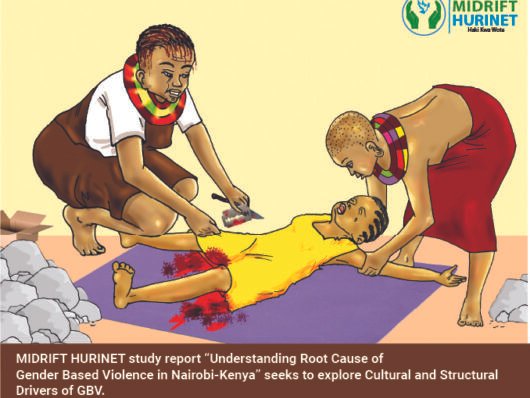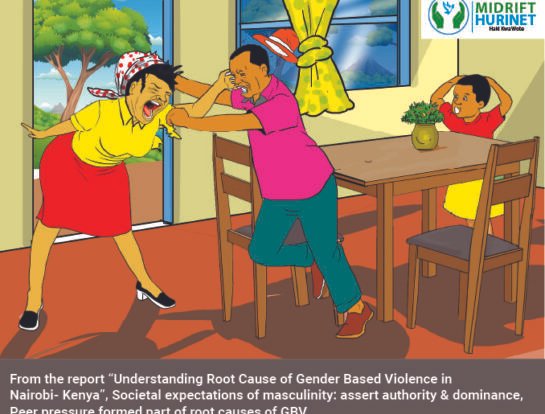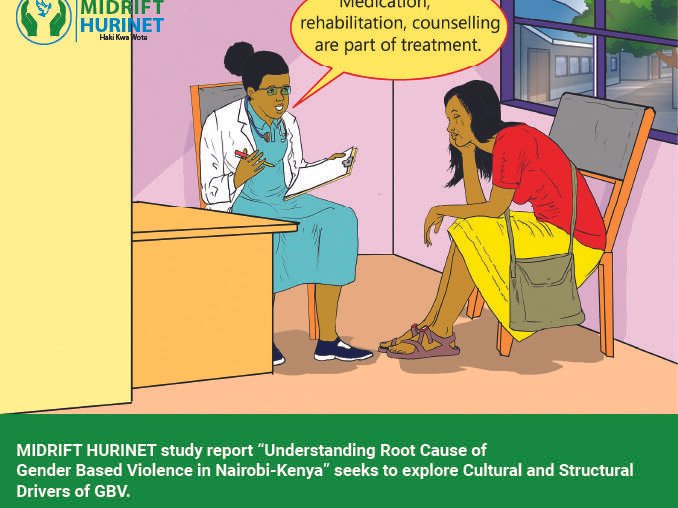Study Report: Understanding Root Cause
of Gender-Based Violence in Nairobi-Kenya
MIDRIFT HURINET’s study, “Understanding the Root Cause of Gender-Based Violence in Nairobi-Kenya,” details the experiences of survivors of Gender-Based Violence in the informal settlements of Mathare, Kibera, Dandora, and Mukuru.

The initiative, funded by MIDRIFT HURINET and supported by the Kenya Human Rights Commission, reflects survivors of Gender-Based Violence (GBV) and community champions advancing a GBV-free society.
This is the second study report on the effects of Gender-Based Violence, with an earlier one focusing on Kaptembwa, Bondeni, and Karagita informal settlements of Nakuru Town West, Nakuru Town East, and Naivasha Sub Counties of Nakuru County.
It aims to create awareness of laws and policies on Gender-Based Violence in informal settlements in Kenya.
It also aims to unravel the complex interplay of socio-economic, cultural, and structural factors contributing to Gender-Based Violence within informal settlements, Understand the root causes of Gender Violence in Nairobi’s informal settlements, and identify strategies to lower its prevalence, Design Evidence-based Programs & replication of best practices by MIDRIFT HURINET, Increase community awareness on the need to transform attitudes & beliefs that normalize the perpetration of GBV,
Provide recommendations to Police, Judiciary and other actors mandated to prevent and respond to GBV in the informal settlements of Nairobi County.
MIDRIFT HURINET aspires to use the study to partner with different stakeholders to implement the recommendations of the study, advocate, and lobby in addressing systemic challenges in Gender-Based Violence, and Implement programs on Prevention and Mental Health and Psychosocial Support Services intervention in Nairobi County, which will inform policy development and recommendations for future research in Kenya.
The report highlights the awareness component in responding to emerging issues of GBV, such as “dominance masculinity”, Kenyan Laws responding to GBV situations, and the Information Communication & Technology component as a tool in fostering alternative positive narratives in unlearning normalized GBV issues in the
community which leads to change in behavior patterns in the community.

It also;
1. Provides evidence of the extent and nature of GBV within Nairobi’s informal settlements, offering valuable insights into the scale of the issue. It intends to inform policymakers, duty-bearers, non-profit organizations, and communities about the urgent need for interventions.
2. Sheds light on the profound physical, psychological, and socio-economic impacts of GBV on survivors, families, and communities. In this regard, there is a need for comprehensive support services and investment in prevention strategies.
3. Outlines various forms of GBV, such as intimate partner violence, sexual assault, female genital mutilation, forced marriages, and more. Identifying patterns within these forms should help design targeted interventions to prevent and respond effectively to specific types of GBV.
4. Identifies specific populations disproportionately affected by GBV, such as women, children, the elderly, and people with disabilities. This highlights the importance of tailoring interventions to address the unique vulnerabilities faced by these groups.
5. It uncovers underlying factors contributing to GBV, including cultural norms, gender inequality, poverty, lack of education, conflict or humanitarian crises, and weak legal systems. Understanding these root causes is crucial for developing prevention strategies and advocating policy changes.
6. Identifies existing support services and systems gaps, such as helplines, shelters, legal aid, health care, and psychosocial support. These findings should be used to
advocate for improved resource allocation and service delivery to enhance survivor support and access to justice.


The study will complement recommendations from the National Crime Research Centre survey, “National Crime Victimization Survey 2023,” which identified Gender (49.4%) as a factor making specific categories of persons vulnerable to crime victimization.
Panel discussants during the launch called for the need for stakeholders to have a common multisectoral approach and avoid working in silos.
They agreed on the need to lobby and advocate for Government-owned safe houses that can also accommodate male survivors of Gender-Based Violence.
As a guide to having Gender-Responsive Budgets in both levels of Government that guide planning and Policy interventions through the County Integrated and Development Plan (CIDP), Annual Development Plan, and the County Fiscal Strategy Paper, panelists agreed on rallying all actors to be active, especially during Public Participation forums.
Dr Catherine Gichuba, Director in-charge of Culture & Tourism, Nairobi City County Government, highlighted existing Acts and Policies by Nairobi City County Government advocating for the Rights of Survivors of Gender Based violence such as the Gender Mainstreaming Policy, Nairobi City County Sexual Gender Based Violence Management and Control Act (2021), and the Persons with Disability Act and the steps taken in regulation and tackling emerging issues on GBV.
She informed participants of the amount allocated to Projects and Programmes by the County Government responding to sexual and gender-based violence. She requested more stakeholder engagement to make them more beneficial to the community.
The findings from the study are;
1. Most cases reported in Nairobi include Defilement, Physical assault, and Sexual assault, and most of the survivors are teenagers between the ages of 13-17.
2. Sexual violence is most common in children, where violence mostly happens from someone known to the child. Children are also more vulnerable to violence during the day.
3. Sexual and Physical violence towards girls and women is also expected, and most of the perpetrators are male between the ages of 26-35, followed by 18-25, and
finally, 36-49
4. Most gender-based violence cases happen at the survivor’s home, followed by a private location (not the survivor’s house), including public places.
5. Social-cultural norms and belief systems in the community justify the use of violence.
6. High preference for resolving gender-based violence cases at the household level and Kangaroo courts are familiar.
7. Poverty and adverse childhood experiences as a contributing factor to Gender Based violence.
8. Existence of Systemic barriers to reporting GBV and accessing necessary services for survivors.
9. Stereotypes and a lack of understanding of the causes of disability have contributed to violence towards PWDs.
10. Limited implementation of laws and policies on GBV.
The panelists also deliberated on situations around Gender reporting desks in Police Stations and agreed to lobby by rallying the National Police Service and other sector players in the Security and Health sector to equip the desks as most had no facilities, the staff stationed there had little or no skill in handling survivors of Gender and Sexual Based Violence, had no Children nor Gender officers stationed at the desks and the need for survivors to understand their Rights as enshrined in the Constitution and not allow their cases to be handled through “Kangaroo Courts” but allow the Judicial System takes its course.
They also agreed on the need to sensitize the community on the anonymous reporting SMS platform, MULIKA UHALIFU 988, for those who feel they might endanger their lives by reporting directly to the authorities.

The recommendations from the study report are;
1. Advocacy for implementation of existing laws and policies on gender-based violence.
2. Streamlining the documentation system for survivors of GBV.
3. Create awareness of laws and policies on GBV in informal settlements.
4. Mindset Shift on beliefs, attitudes & norms on GBV.
5. Promote access to Mental Health Services for survivors: toll-free services, CHPs.
6. Support efforts by actors involved in ending violence, i.e., police gender desks, rescue centers, shelters for survivors, court registry to track child predators
The Panelist reiterated their call to Police Officers and Health Officials not to tamper with Survivors’ Medical Results by filling the P3 form wrongly in an attempt to influence the outcome of a situation; having a transparent database of Mental Health and Psychosocial Support Services (MHPSS) partners to avoid duplication of roles in one area leaving out other places that are in need, KEWOPA to continue advocating for Gender-responsive budgets in the National Assembly and Gender sensitive implementation of budgets, having strategic action plan among all stakeholders to address reoccurring gaps and having male GBV champions in the communities to inform and educate the upcoming generations on normalized GBV situations in the Communities and advocating for more women inclusion in the Community Security Structures.
By
Jacob Karani & Elizabeth Anyango


